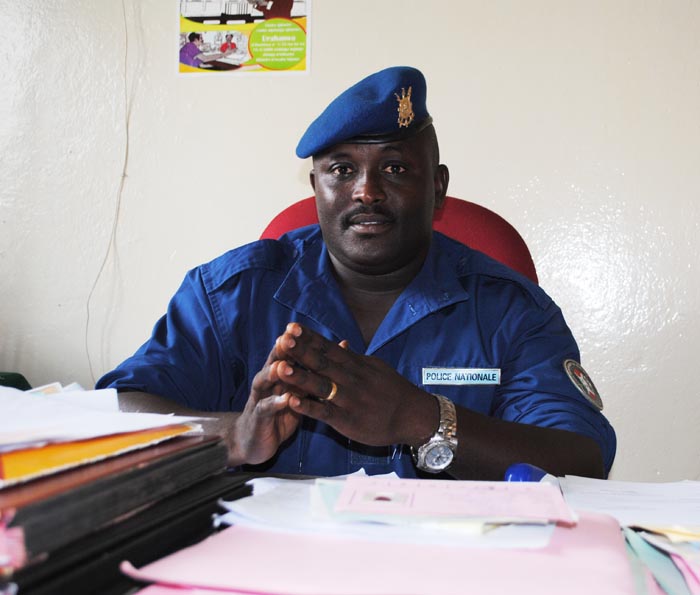Now, the Road Traffic Police are fighting against too old cars. Buses are among the cars which are often arrested because a big number of them don’t respond to road traffic standards. But according to bus drivers, the decision is too harsh.-ByLorraine Josiane Manishatse

Arthémon Nzitabakuze, the Road Traffic Police Commander, “We are arresting buses carrying cans of petrol because very often their tanks have been damaged, this is very dangerous for passengers as they can easily be burned…©Iwacu
Since this last week, cars which do not fulfill road traffic norms have been banned by the Road Traffic Police. Some drivers complain that they are given a heavy punishment. “To arrest us is not bad, but we don’t agree with them to let our cars spend more than three days in Road Traffic Police’s offices without working while we have families,” deplores Alexis Dusabimana, a bus driver.
He adds that they are fined by policemen to pay a lot of money. “For instance, BIF 50 000 for a lack of a headlamp or its breakdown is too much,” states Dusabimana. However, M N, another bus driver salutes the policemen’s work “It is their duty to arrest cars out of norms for avoiding accidents,” he explains. “They should understand that Bujumbura roads are one of the factors that damage our cars before arresting us; on the contrary, they should think about repairing them. Every day we pay BIF 500 to the City Council, they should use that money to facilitate easy and safe transport,” states Richard Nkeshimana another bus driver.
The police reaction
According to Arthémon Nzitabakuze, the Road Traffic Police Commander, during their daily control, they arrest very old buses or cars for urging their owners to control them regularly. “We are arresting buses carrying cans of petrol because very often their tanks have been damaged, this is very dangerous for passengers as they can easily be burned; their seats are very old and customers are not sitting comfortably or their tyres are worn out and this often causes accidents,” he explains. He indicates that the fine for cars varies from BIF 5000 to 20 000, but if the car is badly damaged, we remove its plate number in order to urge the owner to make a technical control. “We do all this to avoid possible accidents in the road”. He warns all Burundian citizens that it is strictly forbidden to put aluminum housing that hides the vehicle’s license plate number even though there are some people who put it to embellish their cars.
“I have asked the Traders’ Association Chairman to ask his colleagues not to import anymore those aluminum housings because we have noticed that they are not made locally,” he says. In conclusion, he invites all Burundians to take part in ensuring the respect of road traffic regulations.














 IWACU Open Data
IWACU Open Data

